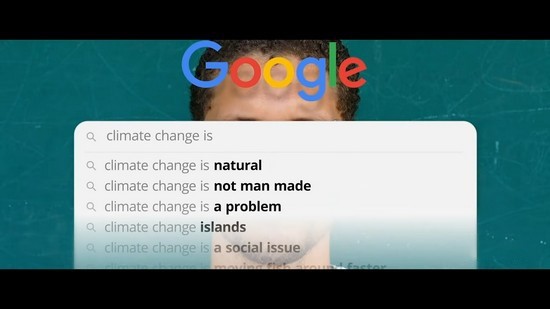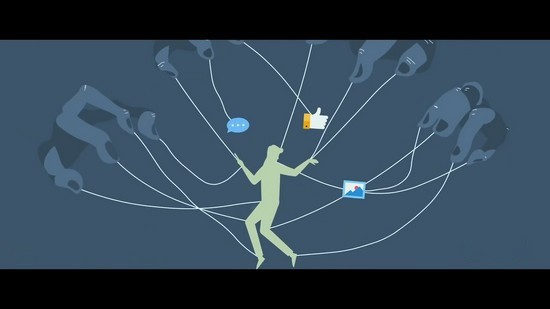The documentary “
The Social Dilemma”, directed by Jeff Orlowski,
denounces the dangers and negative consequences using the internet can have on
our daily lives
اضافة اعلان
The documentary
follows the story of a family whose members use social networks and reveals the
worst consequences they can have on a person: invasion of privacy,
manipulation, suicide, hate speech; all the dangers are discussed and
highlighted.
 (Photos: Royal Film Commission)
(Photos: Royal Film Commission)
Friday's screening of the film is organized by the Royal Film Commission and
UNESCO, and coincides with
the World Press Freedom day.
The movie is
built around interviews with former decision makers from Facebook,
Pinterest or
Google, men and a few women who have contributed significantly to the
development of these platforms and who now warn against the effects of their creations
on the mental health of users and the very foundations of society.
Orlowski decided
to make this documentary after meeting people who deny the existence of climate
change. He wanted to understand why and how these people got to be convinced of
this theory, and quickly realized that social networks had manipulated them.

The underlying
idea of the documentary is clear: there is an assumed desire to manipulate the
behavior of users.
The various
testimonies in the
documentary reveal the hidden mechanisms of social networks
that can endanger internet users by affecting their psychology.
The staging of the
repentant
Former engineers, computer scientists, and managers of financial
optimization who left the houses whose power they had helped to manufacture –
Google, Facebook, Instagram, Snapchat – are beating their guilt by saying that
they had created the devil and are sincerely sorry. It would now be up to us,
simple users, to unplug these machines on which we would have become
dramatically dependent.

But what exactly
do they blame social networks for? For having become, over the years, a huge
enterprise of surveillance and control in the service of an ever more voracious
capitalism. Everyone’s online activities are observed, tracked and measured,
while algorithms exploit users’ cognitive biases to increase their consumption
times, obtain more money and/or personal information, guide their choices and
ensure the success of advertisers.
Surveillance
capitalism
In the field of internet video games, the so-called “Free to play” game
has established itself. However, the “free” does not remain free for long.
Algorithms of which the player is unaware manipulate his choices in such a way
as to make him play always longer, spend always more money and bring always more
monetizable personal data to the platform that hosts his game.

In addition,
this new game model gives a central place to the visibility of the player, in
particular through platforms like Twitch, in such a way that the power of
social networks, which is the quest for visibility, is also widely exploited
there.
Digital
collapsology
But is it really the algorithms that drive us, or the humans that
manipulate them? To believe these pentiti, the algorithms they made would now
work on their own. In reality, they function only at the cost of a mass of
miserable employees spending their time correcting their inevitable faults.
Like any learner, algorithms make mistakes that humans must constantly correct
and put back on the right track.
The algorithms
that direct us
Everything we do
online is tracked and analyzed. What image holds our attention, for how long,
what content we subscribe to, what links we click on… Little by little, the
system identifies our personality, our interests, our behavior and even our neuroses.
Thus, it can not only predict, but also influence our reactions with increasing
precision, turning users into easy prey for advertisers and propagandists,
whether private or state-owned.

The film depicts
how algorithms use psychology to keep us addicted to our screens, according to
techniques studied and taught by the Persuasive Technology Lab at
Stanford University. “A friend just tagged me. I have an alert! Ah, Facebook just
invited me to an event…”
So many
“intermittent positive reinforcements” that keep us checking our phones
repeatedly, like a compulsive gambler hoping for the jackpot at a slot machine.
The manipulation
of our behavior by predictive artificial intelligence in order to keep us
online as long as possible, the collection of our data and their sale to the
highest bidder…, ‘The Social Dilemma’ confirms that all this was wanted and
encoded with Machiavellian precision.
Political
radicalization and loss of self-esteem
The analysis is
not in itself a great revelation, but the comments made are all the more
credible as they come from the designers of these algorithms. Former employees
of Facebook, Google, Instagram and Pinterest deliver exciting elements. Some
say they were not always aware of what they were doing. One, who worked on the implementation
of likes on
Facebook, specifies that he only wanted to bring love. Cruel irony
when we know that this feature is today criticized for its consequences on the
mental health of adolescents.

Very well
designed, ‘The Social Dilemma’ alternates between documentary and fictional
scenes that show the consequences of social networks on an American family. We
can see to what extent these can be a real problem in the formation of an
adolescent, or even lead to political radicalization for some.
The whole is therefore
overwhelming for the web giants. Several stakeholders nevertheless remain
hopeful. Indeed, it seems that good regulation is still possible and allows the
positive effects of the platforms to be maintained, while repelling the
negative effects. Others, on the contrary, advocate very vigorous measures, a
dismantling, even a ban, and do not believe for a second that the solution can
come from large companies busy accumulating profits.
Read more Entertainment
Jordan News



